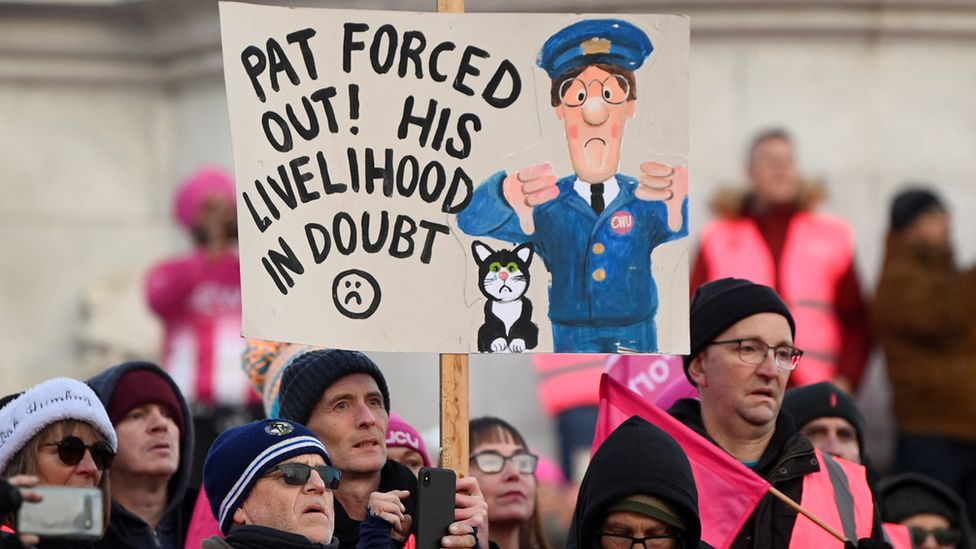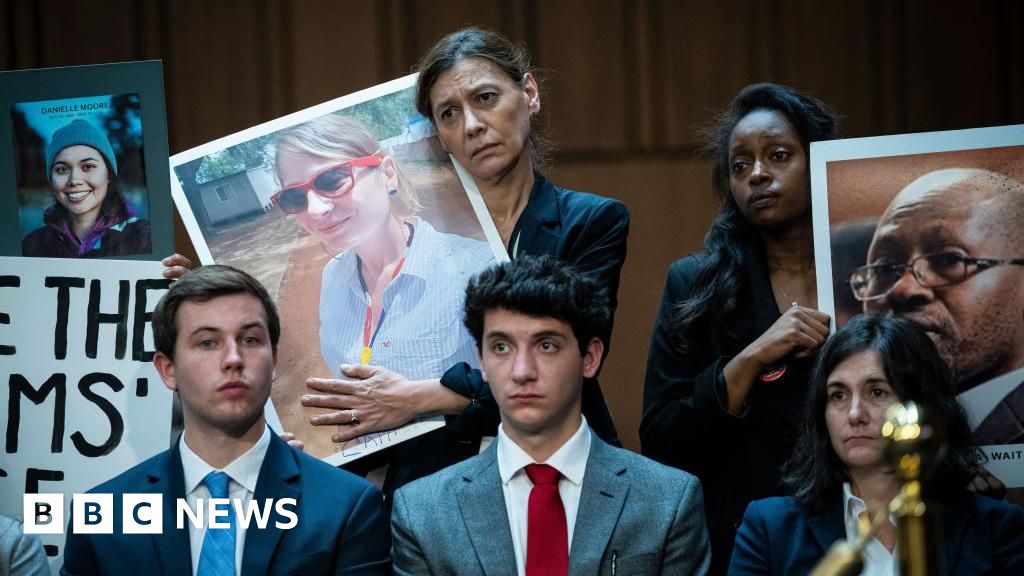ARTICLE AD BOX
 Image source, Reuters
Image source, Reuters
By Dearbail Jordan & Tom Espiner
Business reporters, BBC News
Strikes are picking up pace in the run-up to Christmas as workers squeezed by rising costs fight for higher pay.
In separate industrial action, Royal Mail employees, rail workers, and driving examiners will walk out on Wednesday.
It comes ahead of the first-ever nationwide strike by nurses this week.
On Friday, rail workers, buses, baggage handlers, highway workers and driving examiners will be on strike.
Postal strikes
Industrial action by 115,000 members of the Communication Workers Union (CWU) coincides with the busiest time of year for Royal Mail when people and businesses are sending Christmas cards and presents.
Some parcel companies claim the Royal Mail strike is having a knock-on effect, and forcing them to delay next-day deliveries as people and firms seek alternative ways to send their post.
DPD Group said: "We are experiencing short delays to our next-day delivery service in a small number of locations, as a result of the industrial action at the Royal Mail, which has had a huge knock-on effect across the entire industry."
Evri, the delivery company formerly known as Hermes, said that severe weather, Royal Mail strikes and staff shortages are causing "some localised delays".
While Yodel also said that deliveries are taking longer to some areas but did not specify why.
As well as holding strikes this week, Royal Mail workers will also take industrial action on 23 December and Christmas Eve.
The dispute has been going on since the summer and like all the industrial action across rail, the NHS, teachers, border staff and driving instructors, pay is a key issue.
Workers are seeking wage rises as the cost of living soars. The rate at which prices are rising, known as inflation, is running at more than 11% which is the fastest pace for more than 40 years.
This is largely due to food and energy prices going up.
'Making life hard'
One small business in Brighton which relies on Royal Mail to get its products to customers said the strikes in the run-up to Christmas were "frustrating".
Lucy Bryant, who runs her artist's studio, Haus of Lucy, says she supports the strikers as "everyone has a right to fair pay".
However, she relies "so heavily on the post" to get products from suppliers and to send her art to customers that she says the Royal Mail strikes "have made my life very hard this Christmas season".
"I've got the frustration of my customers to deal with," when artworks don't arrive on time in the run-up to Christmas, she says. "It's frustrating for them, and it's frustrating for me."
Image source, Lucy Bryant
Image caption,Lucy Bryant supports the strikes, but says they have it more difficult to get her art to customers
Some artworks are getting through, and some aren't. "There's almost no logic to what is getting through," she says.
Lucy had to re-order prints that didn't arrive at a cost to the business "that is quite a big hit for me to take," she says.
"I'm not Banksy - yet," she adds.
Lucy says using other postal service providers "is a bit of a wild west", but if strikes continue, she may be forced to find alternatives to Royal Mail, which is a service she trusts.
Public sector squeeze
On Wednesday, the Office for National Statistics will announce the inflation figure for November. In October, that rate was 11.1%.
On Tuesday, figures from the ONS revealed that the gap between wage growth in the public and private sector is near a record high.
The average pay rise for workers in the private sector was 6.9% between August and October. That compares to wage growth of just 2.7% for public sector employees.
A spokesman for Royal Mail said the company had made a "best and final pay offer worth up to 9% over 18 months".
"Instead of working with us to agree on changes required to fund that offer and get pay into our posties' pockets, the CWU has announced plans to ballot in the New Year for further strike action."
But a spokesman for the CWU said that Royal Mail has offered workers a 3% pay rise this year, 3% next year as well as an additional 2% if employees agree to "the absolute destruction" of terms and conditions.
Train strikes
Along with the rail industrial action on Tuesday and Wednesday, there will also be train strikes on Friday and Saturday.
This is part of a long-running dispute between unions, rail firms, the government and Network Rail over pay, job cuts and changes to terms and conditions.
Employees are being squeezed by the rising cost of living, and want pay deals that reflect this.
But the rail industry was hit by a drop-off in passenger numbers during the Covid pandemic, and it's under pressure to save money. Bosses say reforms need to be agreed, to afford pay increases and modernise the railway.
Network Rail wants to cut 1,900 jobs as part of changes to the way its maintenance teams work - although it insists most of this could be achieved by people leaving voluntarily.
The RMT disagrees with some of the changes and wants a guarantee of no compulsory job losses.

 2 years ago
74
2 years ago
74








 English (US) ·
English (US) ·